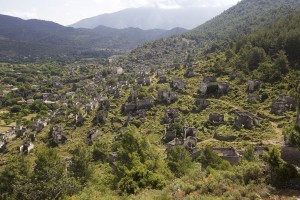Four reasons why a country’s past shouldn’t prevent you from visiting
How do you pick your travel destinations? This is the most frequent question we get, just behind, How much underwear do you pack?
Running a travel blog, we get our share of comments on lodging, destinations and food. However, there’s always an omnipresent buzz-kill of not just readers, but some friends and family, who ask: Why would you travel to that country? I would never EVER want to travel there because of ______!
It’s true. Many of the countries we’ve traveled to have turbulent pasts – countries that have been responsible for the genocide of millions, persecution of its own citizens, and others that have evicted hundreds of thousands of its own people in the name of religion. We’ve also traveled to countries that are politically, or even culturally, at odds with our own ideologies.
So, why do we do it? And, more importantly, why should you?
1. You’ll learn that a country’s citizens aren’t responsible for the past actions of their governments
The Japanese occupied Nanking, a Chinese city, during World War II and subjected its citizens to rape, pillaging and murder, accounting for more than 300,000 lost lives in a matter of a few weeks. The atrocities were so inhumanely mind-boggling that a loyal Nazi party member implored Adolf Hitler to encourage Japan’s government to put an end to the slaughter.
Being half-Chinese, this incident reverberated through several generations of my family. Somewhere along the way, I learned just how easy it is to allocate blame on those that are several generations removed. I have many wonderful Japanese folks as my closest friends that are no more culpable for The Rape of Nanking than I am for the brutal Indian Removal Act in the United States during 1830.
I could not imagine directing any degree of anger or hatred toward my Japanese friends or Japanese people in general. I also couldn’t imagine not advocating to anyone that Japan, with its rich culture, warm people, and amazing cuisine, is a country not worth visiting.
2. You’ll discover historical context and alternative points of view
Just south of Fethiye in Turkey, dilapidated ruins echo a vibrant past in the abandoned ghost city, Kayaköy. Once a thriving Greek Orthodox village, its citizens were evicted by 1923 after the Greco-Turkish War as part of a larger brutal persecution against Christians and Ottoman Greeks. This was one of a few sad chapters in the history of the burgeoning Turkish republic and also an incident that was suggested to us a reason to avoid visiting Turkey.
In Turkey, we had the opportunity to chat with many local citizens. The general sentiment was one of critical regret toward Greek treatment and persecution. Many described the burden of shouldering this painful history. This experience helped us put the incident in context so we could see its impact on local culture and those who have inherited this history.
3. Opening your mind will expose you to unique experiences
Early one morning in March 2009, we were ushered into the packed Ajmer mosque at prayer time in Rajasthan, India. In an instant, a tsunami of sound, pungent smell, and commotion crashed over us. Once prayer commenced, chaos evolved into something purely magical. People were swept into trance-like states. Some quietly had tears streaming from their eyes, others sat with lips silently mouthing the words of prayer.
As an atheist (with a Christian-upbringing), this sudden placement into a mosque in the midst of prayer was the epitome of a fish-out-of-water moment. We were immersed into a raw, emotional and powerful sliver of time that wasn’t our own. It didn’t make a difference that we didn’t share the same religious belief or that we even agreed with the tenants of their religion. It was simply amazing to touch, see and feel human conviction and connection to faith in a different format. This was an experience we nearly missed since we almost opted out of the trip.
4. Otherwise, there would be so few countries left to visit
If you dig deep enough, every country has some tumultuous or negative component to its past. Heck, even Canada produced Justin Bieber in the 1990s!
Living in the United States, I don’t have to look very far back for the unpleasant aspects – whether it’s the persecution of Native Indians, slavery, or a whole slurry of other issues, these incidents are unfortunate, but part of the evolution of our nation and a permanently woven aspect of our historic fabric. It’s also something that we’ve (in all sincere hopefulness) learned from as a society.
I would be remiss to judge and dismiss entire cultures for actions echoing from their country’s past. Harboring this sentiment would eliminate just about every country and culture from our “want to visit” list. Similarly, it would be unfair for others to judge or dismiss my culture based on any aspect of my country’s historic evolution or even on my government’s current actions, some of which I am completely disagree with.
I also don’t mean to suggest that any egregious historic action by a country be forgotten. On the contrary, it’s imperative that we remain aware of the impact of our actions, whether as an individual or a society so that we never forget. Traveling with eyes wide open helps you do that.
Don’t set aside your preconceived notions. Instead, set out to explore them head on. I’ve found that we have a lot more in common than ever imagined with the many people we’ve met during our travels and I think you will, too.


